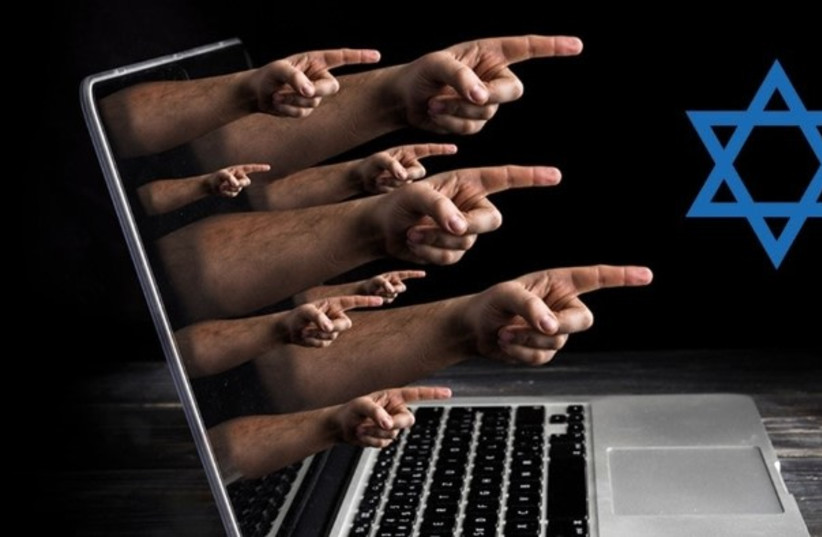In the wake of October 7, I was attending a conference of several major Jewish and pro-Israel organizations in New York. During a seminar, we heard new data, including polling and focus group results revealing deeply concerning trends of antisemitism and anti-Zionism found among minorities and young people – figures and sentiments echoed in the recent Harvard CAPS/Harris poll.
As a social media expert working to combat online antisemitism, this snapshot was consistent with the digital climate my team at CyberWell analyzes daily. With young people spending almost five hours online daily, and with minority teens self-reporting even higher rates of constant social media use and half of US adults citing social media as a regular news source, their attitudes toward Jews and Israel are trending negatively.
What did shock me was a confident response from one panelist who represented a leading coalition combating antisemitism and anti-Zionism.
“Social media is not real,” she declared.
'Social media is not real'

My mouth dropped. Not real? If October 7 and the events following demonstrated anything, it is that social media is all too real – in its ability to terrorize and in its influence over public opinion. Israelis and Jewish communities around the world have been sharply affected by its power, from psychological trauma following Hamas’s livestream of its genocidal attacks to trend-inspired upticks in hate crimes and violence offline in the real world.
Social media and the digital space are the prism through which the next generation views the world. It will shape the state of Jew-hatred and our reality in the decades to come. It is very real, and very broken.
We cannot fix social media by outshouting the haters. Jews make up only 0.2% of the global population – this strategy will not work, and neither will throwing millions of dollars of philanthropic funds at yet another awareness campaign. Even investing in the best multi-million dollar positive content campaigns has documented limitations that fail to extend beyond the pro-Israel/Jewish online echo chamber.
The best method for treating the algorithmically charged virus of antisemitism lies in systematic solutions.
This is why I founded CyberWell – the world’s first database of online antisemitic content. As a data-driven organization, we harnesses technology to identify and categorize antisemitic posts based on the IHRA working definition of antisemitism and then flag the platform-specific policies that they violate. In short, we translate online Jew-hatred into the language that social media companies speak – data points and policy violations – for easily digestible and implementable action.
After October 7, our team charged into the battle raging on social media. Under threat of rockets, we sorted through the horrific content that flooded the platforms, identifying emerging trends and creating reports with actionable recommendations on how content review teams could improve their flagging and removal. As Trusted Partners of the majority of the platforms that we monitor, we succeeded in getting antisemitic hashtags blocked and hateful video clips added for AI monitoring and removal.
Meanwhile, our community’s overarching approach to social media continues to fall short. We wage a losing battle for a fair digital footprint by using these platforms as a conduit for education, raising awareness, and trying to out-shout malicious disinformation campaigns.
While I can admit, there is value in response, feel-good campaigns and positive content have distracted us from what we really need: strategic investment in robust tech-based solutions and initiatives designed to fix the system that is not set up to give us a fighting chance.
We must tread the line of working with social media and big tech directly and demanding their accountability by treating them as the shareholder-driven entities that they are. We must also remain vigilant as content moderation and policy decisions continue to govern the way these platforms amplify antisemitism with little to no formidable response from our leadership.
For example, most social media platforms recognize Holocaust-denial and Mein Kompf as policy-prohibited content. But they do not extend the same recognition to denial of the Hamas attack on October 7 or the promotion of the Protocols of the Elders of Zion.
Alternatively, take a look at the case currently under review by Meta’s independent Oversight Board. They are determining, via expedited review, future Meta policy based on a post depicting Shifa Hospital in Gaza City which refers to the IDF as a “usurping occupation.” This content moderation policy is being determined with no stakeholder input. Meanwhile, the Oversight Board and Meta are under high-profile organized public pressure campaigns from Human Rights Watch and other terror-connected non-profits to be more lax on strict enforcement of pro-terror and Islamic content.
These clear failures in policy should be the talk of the Jewish community as their generational impact extends far beyond the campuses of Harvard, MIT, or Penn.
Social media platforms are the key to reversing over a decade of antisemitic brainwashing – if we can get our act together. Only by methodically monitoring these systems, divulging their failures, and making the tools and data points easily accessible, can we make a difference.
The writer is the founder and executive director of CyberWell, an ethical-tech nonprofit working with social media platforms to monitor and catalog antisemitic rhetoric, while improving enforcement.
